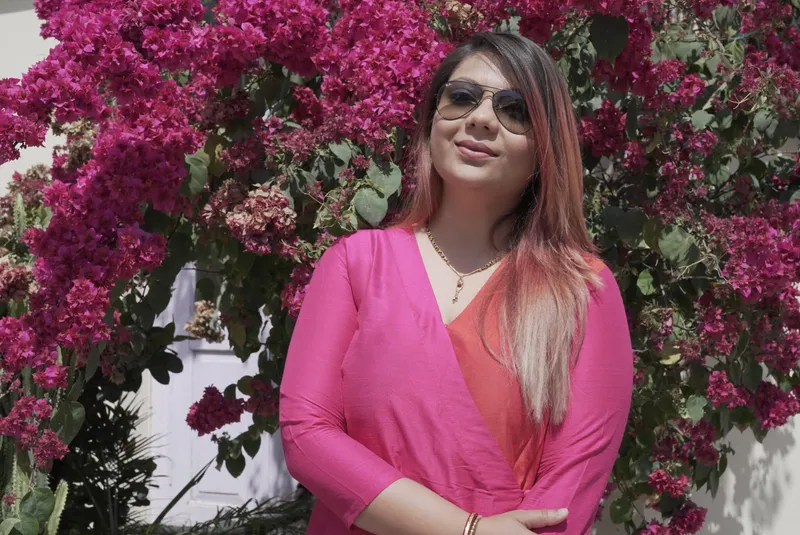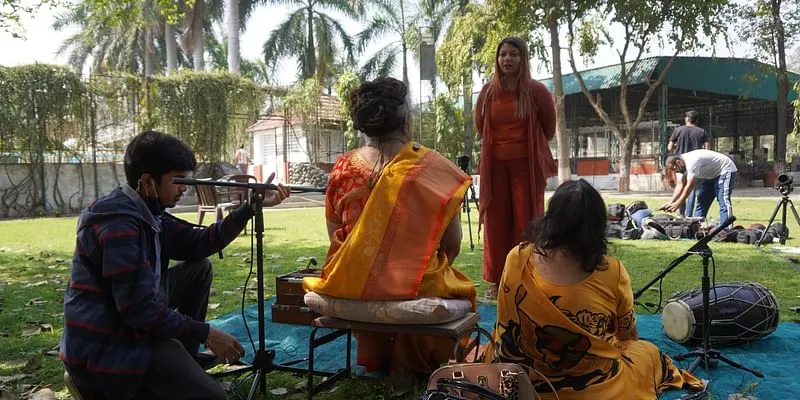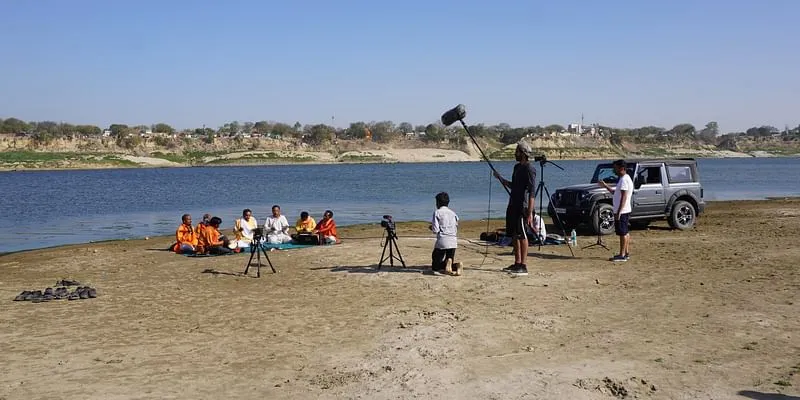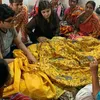How this Delhi-based foundation is empowering over 5,000 Indian folk musicians
Delhi-based Anahad Foundation is working to preserve folk music and empower folk musicians by helping them find a platform to showcase their talents.
Indian folk artists — with their rustic music, dances, and numerous instruments — have been an integral part of the country’s rich heritage.
While many have tried to give Indian folk music a modern twist, in the 21st century, its impact and reach is getting diminished.
However, all is not lost. Anahad Foundation is working towards bringing back folk artists to the spotlight.
The Delhi-based organisation helps in the conservation and preservation of the evolution of folk music by empowering folk artists across India with free production technology, providing legal awareness, thereby making them self-dependent.

Shuchi Roy
With a passion for standing up for her human rights, Shuchi Roy joined Anahad Foundation as the Managing Director. She takes care of artists’ copyrights and Intellectual Property (IP) issues, besides being actively engaged with them on the ground.
Her possession of managerial skills and passion for folk musicians has helped her reach out to these artists. Shuchi — besides her role as the managing director — also looks after Anahad’s daily legal activities.
In a conversation with SocialStory, Shuchi discusses her journey with Anahad, and how the foundation has managed to impact over 5,000 Indian folk artists.
SocialStory [SS]: What was the inspiration behind the Anahad Foundation?
Shuchi Roy [SR]: Anahad Foundation was established in 2013 when my husband Abhinav and I were in our third year of graduation. The inspiration stemmed from Abhinav Agrawal— the Director and CEO of the organisation — who, at the age of five, was learning Hindustani classical vocals and tabla from the Allahabad Gharana.
While he had the best teachers, their inability to record their music was an unfinished dream. Since then, he had been sure he would give free music production technology to artists in need.

Shuchi helping an artisan create a video
Meanwhile, I had a knack for fighting for rights from a young age. I was never scared to speak the truth and fight for rights for myself or anyone else. This further led me to pursue a law degree.
I worked at the Supreme Court of India with a senior advocate. But my desire to help the needy was not fulfilled. So I joined Anahad full time to work for folk artists, making sure they are aware of their rights.
SS: What is the goal of the foundation?
SR: Anahad works towards the conservation and preservation of the evolution of folk music by empowering folk artists across India with free production technology, providing legal awareness, thereby making them self-dependent.
For us, reaching out to artists is the first and the hardest step. We find several artists on the internet, but only about 0.01 percent would be folk artists.
We select a region and reach out to the authorities at various levels, and at times, go door-to-door finding them.
Our target audience can be found in all age groups, but we focus more on particular regions, where the artists belong as the music tracks are in the regional dialect.
SS: Tell us a little about your Backpack Studio initiative.
SR: Backpack Studio is a technology that helps us uplift and revive tribal folk communities and make them self-reliant with the help of smartphones.
Through this initiative, we are providing modern technological solutions to the problems faced by these communities. This is an extensive project that fits into agendas like skill-building, capacity building, and restoring the heritage and tradition of folk music.
The project’s primary objective is limited to recognising and studying rare folk art forms while also developing websites for folk musicians. We convert an artists’ intellectual property into a tangible form and create a self-sustainable economic environment, where an artist can communicate directly with a customer without any middleman getting involved.
We also promote the documentation of art forms to protect them from fading away due to socio-economic reasons. We also protect the original compositions of the artists so that they are not misused without prior permission of the author.

During the shoot of one of the videos
SS: Are there any other initiatives in addition to the preservation of folk music?
SR: We run another initiative called — Equals Sessions — where we collaborate with contemporary artists to empower songwriters from folk communities. We invite prominent composers to learn from each other while coming up with a new composition in five days.
One of the growing concerns among folk artists is that production facilities are expensive, and they find it difficult to reach out to producers. To tackle this issue, Anahad Foundation has been working towards creating a digital identity for these artists by facilitating production, recording, and digital platforms for the past two years. The results have been quite encouraging.
Another initiative — Equals Music Project — is a research-based project that aims to bring forth novel, innovative, and sustainable ways of furthering the musical traditions of tribal folk artists and their communities through collaborations.
SS: What is the impact you’ve had with Anahad?
SR: During the COVID-19 pandemic, Anahad provided a relief of Rs 85 lakh to over 5,000 artists in 78 locations across 10 Indian states, including Tamil Nadu, Karnataka, Uttar Pradesh, Himachal, Jharkhand, Nagaland, Assam, Rajasthan, to name a few, through the ‘Chaukat Ki Goonj’ initiative. Each artist was given Rs 1,000 as a stipend for the videos as well.
Due to the website and business card created by Anahad for the artists, many artists got platforms on national and international stages. They have got opportunities to perform on stages like NH7 weekender, Ragastaan, etc.
The funding has mostly been through philanthropic organisations, including Harish and Bina Shah Foundation, Nilekani Foundation, Azim Premji Philanthropic Initiatives, etc. Various corporates’ CSR arms such as , , Yes Foundation, and Book A Smile, among others, have also contributed towards our cause.
SS: Moving forward, what are your plans?
SR: Anahad wants to empower all folk artists with music production in an effort to get them the recognition of mainstream artists. Our website has the biggest Indian artists directory, with their contact details.
We are working towards making the folk artists self-dependent so that they are aware of their rights and feel confident to pass on their art and heritage to the next generation.
Edited by Suman Singh









